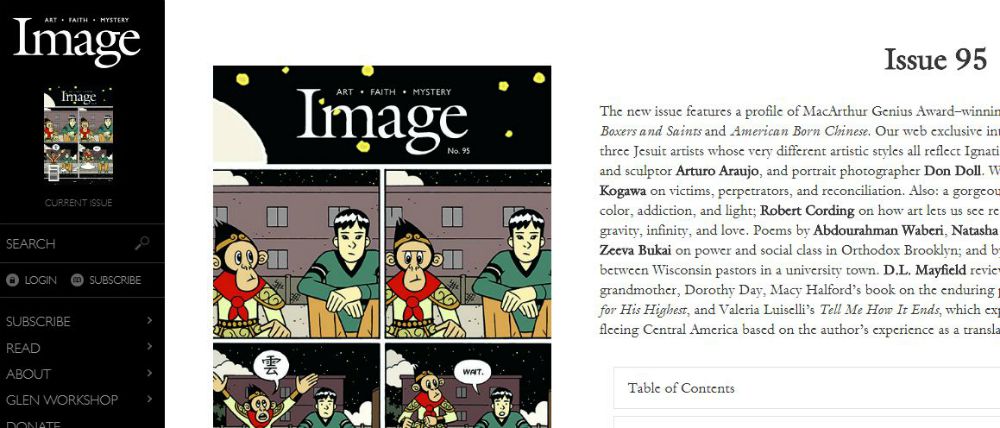
Screenshot, May 1, 2018, of Image journal's Issue 95 website page
The announcement last week that Image, a Seattle-based journal with the tagline "art, faith, mystery," had fired its charismatic founder just months shy of its 30th birthday is dividing the community around the publication, whose former contributors include literary luminaries John Updike, Elie Wiesel, Annie Dillard and Louise Erdrich.
An eight-month investigation found Gregory Wolfe guilty of serious leadership lapses, "including accusations of a hostile and challenging work environment, harassment in the workplace, and other behavior that has hurt many who love Image and its ideals," the board wrote.
The news caught many by surprise coming from the journal that holds a beloved, annual summer workshop in Santa Fe called The Glen, whose motto is "A week can change a life." Content published in Image had been read on Garrison Keillor's radio program, and Harper's and the Wilson Quarterly have excerpted it, per the Image site.
Responding to the board's announcement, one person tweeted and tagged Wolfe, "Looking forward to hearing your side of the story." Wolfe liked the post, but his handle, which previously tweeted multiple times daily, has since gone dark. "I guess I'm no insider, but yeah, I am very surprised," another added.
Longtime Image subscriber Laurel Dugan, who is a one-time Glen attendee, praises the founder of the journal, which she describes as "the only really-serious publication for artists, who self-identify as Christian and are really interested in examining the intersection of faith and art." Attending the workshop boosted Dugan's confidence and surrounded her with people who made her feel normal. She notes that the board's statement didn't specify sexual harassment. "I would be very surprised if that was the case," she said.
According to Dugan, Wolfe is an effective teacher who engages people aggressively from an intellectual perspective.
"I've seen people become offended by that, but I think if you can't handle that then maybe you shouldn't work in the world of ideas," she said. "You can grow a lot in conversation with him, because he pushes you along in your own thoughts."
"I think the board is doing a great disservice by leaving all of this ambiguity out there — to Greg and possibly to the whole institution. If they thought they should make a statement, they should make it clearer," she said. "I think it's very cruel to not give a man a fair trial. I think we can all agree on that as Americans."
But on social media and in interviews with NCR, others told very different stories about years of bullying and intimidation at Image, as well as alleged sexual harassment.
An alleged pattern of abuse
"Third man I've worked with in a professional capacity to be removed for harassment within six months. All Catholics, by the way," tweeted Kaya Oakes, who teaches nonfiction writing at University of California, Berkeley. (Oakes has also written for NCR.)
When she taught at The Glen one summer, Oakes sensed a stressed and overworked vibe from Image staff and interns.
"His reputation before the firing was again one of contradictions," she said of Wolfe. "An intelligent person who'd started something with spiritual value for many people, but someone who seemed even from the outside to have issues in communication."
Several former employees of Image, who asked to remain nameless, in part fearing retribution, confirmed that sexual harassment was among the allegations. That included "inappropriate comments of a sexual nature to an employee, both in the workplace and during work travel," one said. "It's one manifestation of Greg's abuse of power in the workplace. It's not the only manifestation, and I don't know that it's the most severe."
On a work trip, according to a former Image employee who was then a recent hire, Wolfe told her over dinner in a hotel that on a previous, overseas work trip the prior month he had felt that "something was going to happen between us." The employee interpreted that to mean of a sexual nature. The employee told Wolfe that the feeling wasn't mutual, she said, but instead of apologizing, Wolfe began to list the reasons it was logical to assume there was sexual tension. Those included knowing where she came from, which she assumed referenced her working class background, and Wolfe gesturing toward the hotel's waterfront view and saying he had given her "all this."
"I have been asked if Greg propositioned me; he did not do anything as forthright as that," she said. "What he did was something more insidious and aligned with the other, non-sexual types of abuse reported by staff to the board. He tried to make me think and feel that his shortcoming was my own."
Advertisement
Another former Image employee confirmed hearing what happened within months of the trip.
At Image, which a former employee characterized as a top-down organization with a charismatic, respected leader, there were "forms of abuse, control, manipulation, harassment, and silencing" that were specific to Image, the former staffer said. "But these problems can and will manifest in organizations where a leader with too much power and too little concern for the well-being of his subordinates can exhibit those behaviors with little to no oversight, especially when a broader, uninformed community affirms him and his vision at every turn."
Wolfe's behavior harmed both male and female staff, according to the former employee. "I say this not to diminish those particular forms of harm by any means, but rather to illustrate that the breadth and variety of harm should be indicative of a deeper problem," the person said.
In an email, Wolfe told NCR, "It is evident from your questions that you are considering reporting secondhand accusations that are untrue." He added that he will issue a public statement when he has received answers from questions that he has posed to the Image board.
A mission-driven investigation
Late last year, the Image board announced midway through a fundraising letter that Wolfe would take on a new role at the journal starting in January 2018. The journal had worked with Wolfe on a new strategic plan, which would "deepen and extend the reach of our mission," the letter stated, noting that Image had launched a search for a new executive director, who would oversee operations. Wolfe, in his new capacity, would have "time to extend his presence as a distinct and compelling voice for art and faith in the public square, while we build up Image's capacity to fulfill our mission," the board stated.

Screenshot May 1, 2018, of part of Image journal's fundraising letter at imagejournal.org/donate
While some, like longtime subscriber Dugan, interpreted that announcement to mean that nothing too nefarious could have occurred, those who accused Wolfe of misconduct saw the process differently.
"This lack of transparency resulted in us feeling like we still had a secret to bear, and that the board was prioritizing Greg's and Image's public reputation over us carrying that secret still," one former employee said.
The tone of the board's public statement last November, the former employee added, didn't make those who were hurt feel supported. Not only was the announcement mentioned in the middle of an appeal letter, but it "framed Greg's removal from the position as a long-planned retirement of sorts that would free him up to focus on being a larger presence in the public square," the former employee said.
The board said it chose to undergo an eight-month process in line with its mission. That included following Matthew 18, which prescribes approaching a sinner privately in the hopes that the person will repent, according to Vancouver attorney David Jennings, vice chair of the Image board and interim executive director since last November. (The board has extended an offer to a candidate who it hopes will lead Image forward, he said.)
The hope, Jennings said, was that Wolfe would accept the charges, repent and restore, and hopefully try to reconcile. But after a lengthy process, that was unsuccessful, Jennings said. The process was painful for the entire board, as Wolfe had handpicked each volunteer member — each a close friend of his, Jennings said — but in hindsight, the entire board still stands behind the decision, which honored the Christian character of Image, to give Wolfe a chance to fix things rather than firing him outright in 2017.
"There's a reason the board offered to pay for our counseling. No one was paying close enough attention to the collective mental health at the office."
— Former Image employee
Asked if the allegations against Wolfe included sexual harassment, Jennings said that the board could not disclose more of the substance of the complaints than what it had stated in its letter. The board has set aside funds, consistent with its limited resources, to help cover some of the counseling costs employees, former employees, and Wolfe himself might incur, Jennings said.
"Throughout the investigation, the analysis, the discernment, and the engagement with the victims and with Mr. Wolfe, the board was primarily focused on the pattern that we uncovered of his creating a culture of intimidation and threats with many people, staff, contributors, donors, institutional partners. We believe it's that overall pattern rather than any one incident, which prompted our decision," Jennings said.
Broader ripples in the Catholic community
On his website, Wolfe notes deep ties to Roman Catholicism, the faith he converted to. Berkeley's Dominican School of Philosophy and Theology awarded him an honorary doctorate; he attends Seattle's St. James Cathedral with his family; and he belongs to the lay ecclesial movement Communion and Liberation.
The author of many books, Wolfe has upcoming ties to several Catholic institutions. Loyola University Chicago named him Pierre Teilhard de Chardin visiting scholar in Catholic studies this fall, and he is slated on May 10 to speak about Erasmus at the New York Archdiocese-backed Sheen Center for Thought and Culture.
A spokesperson for Loyola University Chicago said that Wolfe is not currently on faculty. "Although he has been invited to teach as the university's Chardin fellow in the fall semester, Loyola University Chicago takes allegations of harassment seriously and is currently seeking out all the facts," she said.
A spokesperson for the New York Archdiocese asked to receive a written request from NCR for a statement, but then didn't issue a comment.
Wolfe is not currently an employee of Seattle Pacific University, said a spokesperson for the Christian school where he founded the Master of Fine Arts program in creative writing. "We do not plan to release any statement about this," she said, directing questions to Image. A "short bio" on Wolfe's website states that he continues to teach at Seattle Pacific University, however, and a photo he posted on Facebook shows him manning a table with Image and Seattle Pacific University signage at the Festival of Faith & Writing, held weeks ago at Calvin College in Grand Rapids, Michigan. The picture shows copies of the most recent issue of Image, released last February.
Image has been housed at Seattle Pacific University since 2000, but Wolfe resigned his position at the university's MFA program two years ago, the university spokesperson said. "I'm guessing the SPU signage … at the festival was related to SPU's MFA in Creative Writing program," she said. "Greg was an adjunct professor in the program until recently."

Screenshot May 1, 2018, of Image journal's Facebook page, showing speakers for the Glen workshop the publication holds
What comes next?
With the Glen workshop looming July 29 to Aug. 5 at St. John's College in Santa Fe, some members of the Image community have expressed reservations about attending. The Glen usually attracts about 140 participants, with about half of the slots being full by this time of year, and this year's number of enrollees is consistent with prior years, Jennings said. There hasn't been "any material number" that has pulled out, and all of the faculty members have affirmed their commitment to participate, he said.
But the Image community clearly faces challenges moving forward without its charismatic founder. Former employees who say Wolfe harmed them recommend that the journal employ an industrial organizational psychologist.
"There's a reason the board offered to pay for our counseling. No one was paying close enough attention to the collective mental health at the office," one former employee said. "Bring a professional in to check the water regularly, long before people start falling sick individually." The former employee credited the board with voluntarily offering to help support counseling.
Other suggestions that former employees, who allege abuse, shared included bringing long-overdue "fresh blood" into an office that was getting "a little set in its ways" rather than transformative. "Some daylight between the outgoing and incoming leaders would be welcome," the former employee said.
To the broader community, a former employee discouraged fearing the future. "Embrace it. Image and the Glen are not synonymous with one single person," the person said. "The collection of people who come together year after year with their hurts and longings, these people are Image. It belongs to them and always has."
"An organization like Image that advocated so strongly for the power of beauty to heal brokenness should not have been in the business of breaking people," the former employee allowed. "But the community knows what to do now: Face this brokenness head-on, and don't look away. Let the light in."
[Menachem Wecker is a freelance reporter in Washington, D.C. He holds a master's degree in art history from George Washington University, is a former education reporter at U.S. News & World Report, and is co-author of Consider No Evil: Two Faith Traditions and the Problem of Academic Freedom in Religious Higher Education (2014). His website is menachemwecker.com.]








